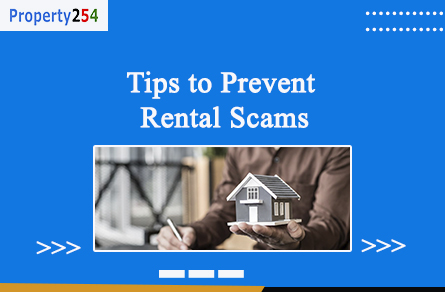Rental scams come in different forms and can be a major concern for landlords and tenants. The scams that are targeted at landlords are totally different from the scams that are targeted at tenants. As a Kenyan landlord protecting yourself from rental scams requires due diligence and attention to detail.
In this article, we will provide an overview of 8 common rental scams in Kenya and offer tips on how to protect yourself and your property from potential fraud.
1. Impersonation scam.
Some scammers may try to rent a property on behalf of someone else in order to avoid background checks or other screening processes.
To avoid this type of scam, it is important to verify the identity of the person signing the rental agreement by asking for a copy of their Identity card and to ensure that they are the actual person who will be living in the rental property.
2. Changing occupants scam.
Changing the occupants of a rental property without the landlord’s knowledge or approval has become a common scam. This is done by moving new tenants in without the landlord’s permission.
To avoid this type of scam, include a clause in your rental agreement that prohibits changing occupants without your prior written consent.
3. Subleasing scam.
Subleasing is when a tenant rents out a property to someone else, either for a short period of time or for the remainder of the tenancy. This can be a legitimate way for a tenant to transfer their tenancy to someone else, but it can also be used as a way for scammers to avoid paying rent or to exploit vulnerable people.
To avoid this type of scam, clearly communicate with your tenants about the terms of the rental agreement, including any provisions related to subleasing.
4. False co-tenants scam.
Tenants may lie about whom they will be living together with in a rental property in order to get around background checks or other screening processes for those other people.
To avoid this type of scam, it is important to verify the identities of all tenants and to ensure that they are the actual people who will be living in the rental.
5. Damage concealment scam.
Some scammers may damage a rental property and then try to hide the damage when they move out in order to avoid paying for repairs.
To avoid this type of scam, it is important to document the condition of the property when a tenant is moving in and have it checked when the tenant is moving out.
6. Fraudulent purpose for renting scam.
Some scammers may rent a property for a purpose that is not allowed by the rental agreement, such as running an illegal business.
To avoid this type of scam, clearly communicate with your tenants about the terms of the rental agreement, including any provisions related to the allowed use of the property.
Include a clause in your rental agreement that prohibits any illegal or inappropriate use of the property.
7. Inability to pay rent scam.
Tenants may rent a property and then later claim that they are unable to pay the rent due to unexpected circumstances, such as a sudden illness or job loss.
To avoid this type of scam, it is important to carefully screen tenants and to require a security deposit or other form of financial protection.
8. Fraudulent repair requests scam.
Some tenants may try to defraud landlords by submitting false or exaggerated repair requests in an attempt to get free repairs or to avoid paying rent.
To avoid this type of scam, it is important for landlords to carefully document all repair requests and verify that the work was actually completed.
Conclusion,
Rental scams are pervasive and evolving problems that affect landlords.
While it may not be possible to completely eliminate the risk of falling victim to a rental scam, being vigilant and following the tips outlined in this article, can help you protect yourself and your property from fraudulent activities.
Together as landlords, we can help make the rental process safer and more secure for everyone.
If you have any questions or concerns about rental scams, feel free to comment below. We will be glad to share our advice.

Leave a Reply